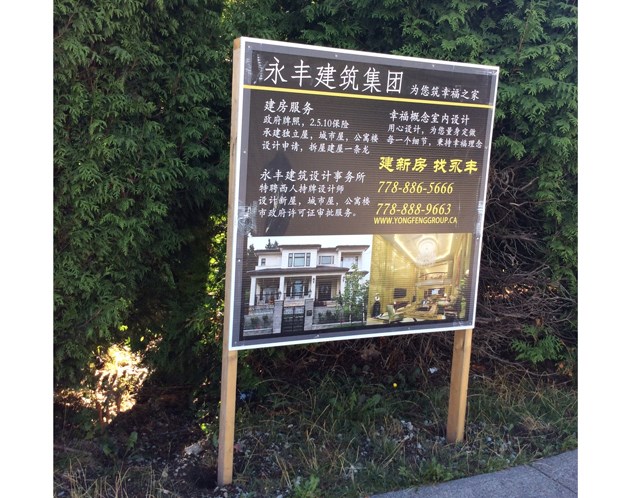The question was posed at an all-candidates meeting Oct. 23:
Why is important to have bylaws against non English signs?
Mandating signs would violate Charter but bylaw still possible
- Janos Bergman said it's "very important" because "language binds us." Bergman, who was born in Hungary, began to speak Hungarian to make a point.
"You don't understand it because I did not use the language we are using here in Canada, which is English first. Language signs are far more important to be English first so that everybody feels included."
- Henry Yao said he echoed the same sentiments of Bergman.
"The goal is for communication. Not for advertisement."
Yao said he would encourage consultation.
"How do we move forward? Let's make community is part of that consultation," said Yao, who previously favoured a sign bylaw.
- Carol Day, RITE Richmond, said she does "not think we need an actual bylaw. I'm not sure we legally would be allowed to have a bylaw. This is 90 per cent education and 10 per cent regulation. I believe if we go out to the community or the stores that are having trouble communicating in English and give them assistance and encourage them to be more mainstream I believe they will be doubling their business. But in the end it's really about working together as a community and we have to deal with this, we cannot shy away from this issue any longer."
- Sal Bhullar, RCC, noted she immigrated to Canada when she was in Grade 2. She was asked by her parents to teach them English so they could be part of the community.
"It's about community. It's about all of us. And I do believe some guidelines need to be set but it cannot create an us and them situation because someone thinks they have all the answers sitting on the sidelines," said Bhullar, looking at Day.
- Harold Steves, RCA, noted city staff haven't consulted directly with the business owners.
"A sign bylaw will only be successful if there is a major affront to community harmony."
He said the city is now working to find this out.
- Dave Semple noted he reached out to people with Chinese-only signs and suggested:
"Do you wonder if we just all go out and do that and see a sign and talk to the person about how you're hurting us and how we feel we're not in harmony, that may be the start of harmony? I think that's a discussion point. …Bylaws means you enforce it which means you hire staff to have to enforce it, and that costs money."
- Linda McPhail, Richmond First, said immigration has changed and people find comfort in their language. She said she followed city legal opinions that a bylaw wasn't enforceable, thus she followed that advice.
Elsa Wong, Richmond First, said "yes there should be English on signs, for English is our native tongue in Richmond. However we got to look how we can enforce it and how much it would cost. Currently the majority of signage has English on them already, at least a measure of 50-50."
She said Richmond First will find a solution that is "fair" and "harmonious to all."
- Adil Awan said his family "immigrated to Canada in 1970 from Uganda and when we found out we were coming to Canada my parents insisted we learn English (my mom speaks fluent French). So when we came here my dad had a simple rule: inside the home you speak our language but outside you make sure you fit into the community. And we (brothers) were five and six years old. I never forgot that. You can't control this by enforcement. You need education. You need to educate immigrants when they come in and show them that yes this is Canada and English is the language and everybody speaks (English)."
- Roy Sakata said his mother encouraged the family to speak English and if he spoke Japanese she would punish him.
"In a multicultural society, the benchmark has to be, whoever is making the sign, the question has to be asked, does this make everyone in the community feel a sense of community?"
- Chak Au reiterated there must be English on every sign and any bylaw would have to be fair and reasonable. He added that education and cultural interaction needs to be increased and local media can play a role in helping businesses understand the issue.



